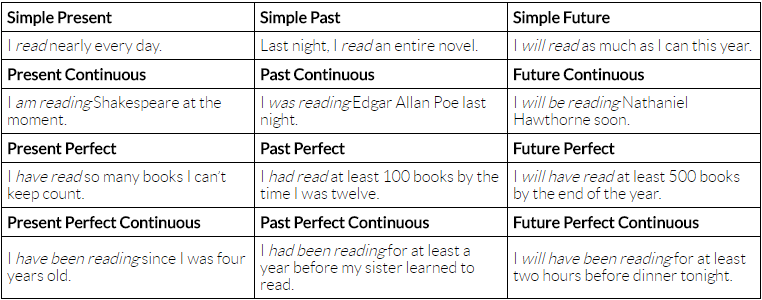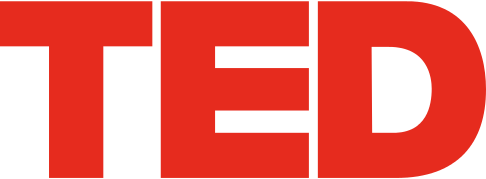Hello Guys
Thanks for joining me!
Good company in a journey makes the way seem shorter.
— Izaak Walton

Thanks for joining me!
Good company in a journey makes the way seem shorter.
— Izaak Walton



The simple present is a verb tense with two main uses. We use the simple present tense when an action is happening right now, or when it happens regularly (or unceasingly, which is why it’s sometimes called present indefinite). Depending on the person, the simple present tense is formed by using the root form or by adding ‑s or ‑es to the end.
Example: I feel great! Pauline loves pie. I’m sorry to hear that you’re sick.
Typically, when we want to describe a temporary action that is currently in progress, we use the present continuous: Pauline can’t come to the phone right now because she is brushing her teeth.
In the simple present, most regular verbs use the root form, except in the third-person singular (which ends in -s).
First-person singular: I write
Second-person singular: You write
Third-person singular: He/she/it writes (note the ‑s)
First-person plural: We write
Second-person plural: You write
Third-person plural: They write
For a few verbs, the third-person singular ends with -es instead of -s. Typically, these are verbs whose root form ends in o, ch, sh, th, ss, gh, or z.
First-person singular: I go
Second-person singular: You go
Third-person singular: He/she/it goes (note the ‑es)
First-person plural: We go
Second-person plural: You go
Third-person plural: They go
For most regular verbs, you put the negation of the verb before the verb, e.g. “She won’t go” or “I don’t smell anything.”
The verb to be is irregular:
First-person singular: I am
Second-person singular: You are
Third-person singular: He/she/it is
First-person plural: We are
Second-person plural: You are
Third-person plural: They are
The formula for making a simple present verb negative is do/does + not + [root form of verb]. You can also use the contraction don’t or doesn’t instead of do not or does not.
To make the verb to be negative, the formula is [to be] + not.
The formula for asking a question in the simple present is do/does + [subject] + [root form of verb].
| Infinitive | I, You, We, They | He, She, It |
| to ask | ask / do not ask | asks / does not ask |
| to work | work / do not work | works / does not work |
| to call | call / do not call | calls / does not call |
| to use | use / do not use | uses / does not use |
| to have | have / do not have | has / does not have |
| Infinitive | I | You, We, They | He, She, It |
| to be | am / am not | are / are not | is / is not |

TED Conferences LLC (Technology, Entertainment, Design) is a media organization that posts talks online for free distribution under the slogan "ideas worth spreading." TED was conceived by Richard Saul Wurman in February 1984 as a conference; it has been held annually since 1990. TED's early emphasis was on technology and design, consistent with its Silicon Valley origins. It has since broadened its perspective to include talks on many scientific, cultural, political, and academic topics. It is owned and curated by Chris Anderson, a British-American businessman, through the Sapling Foundation.
The main TED conference is held annually in Vancouver, British Columbia, Canada at the Vancouver Convention Centre. Prior to 2014, the conference was held in Long Beach, California, United States. TED events are also held throughout North America and in Europe, Asia and Africa, offering live streaming of the talks. They address a wide range of topics within the research and practice of science and culture, often through storytelling. The speakers are given a maximum of 18 minutes to present their ideas in the most innovative and engaging ways they can. Past speakers include Bill Clinton, Sean M. Carroll, Elon Musk, Ray Dalio, Cédric Villani, Stephen Hawking, Jane Goodall, Al Gore, Temple Grandin, Gordon Brown, David Cameron, Billy Graham, Richard Dawkins, Sam Harris, Bill Gates, Dolph Lundgren, Bob Weir, Shashi Tharoor, Bono, Larry Page and Sergey Brin, Leana Wen, Pope Francis, and many Nobel Prize winners. TED's current curator is Chris Anderson, a British-American businessman, computer journalist and magazine publisher.
Since June 2006, TED Talks have been offered for free viewing online, under an Attribution-NonCommercial-NoDerivatives Creative Commons license, through TED.com. As of January 2018, over 2,600 TED Talks are freely available on the website. In June 2011, TED Talks' combined viewing figure stood at more than 500 million, and by November 2012, TED Talks had been watched over one billion times worldwide. TED Talks given by academics tend to be watched more online while art and design videos tend to be watched less than average.
source: wikipedia

10 Reasons to Learn English
1. English is the most commonly spoken language in the world. One out of five people can speak or at least understand English!
2. English is the language of science, of aviation, computers, diplomacy, and tourism. Knowing English increases your chances of getting a good job in a multinational company within your home country or of finding work abroad.
3. English is the official language of 53 countries. That is a lot of people to meet and speak to.
4. English is spoken as a first language by around 400 million people around the world.
5. English is the language of the media industry. If you speak English, you won't need to rely on translations and subtitles anymore to enjoy your favourite books, songs, films and TV shows.
6. English is also the language of the Internet. Many websites are written in English – you will be able to understand them and to take part in forums and discussions.
7. English is based on a simple alphabet and it is fairly quick and easy to learn compared to other languages.
8. English is not only useful – it gives you a lot of satisfaction. Making progress feels great. You will enjoy learning English, if you remember that every hour you spend gets you closer to perfection.
9. Since English is spoken in so many different countries there are thousands of schools around the world that offer programmes in English. If you speak English, there're lots of opportunities for you to find an appropriate school and course to suit your academic needs.
10. Because it's fun! By learning English, you will also learn about other cultures. Few experiences will make you grow as a person more than learning the values, habits and way of life in a culture that is different from yours.